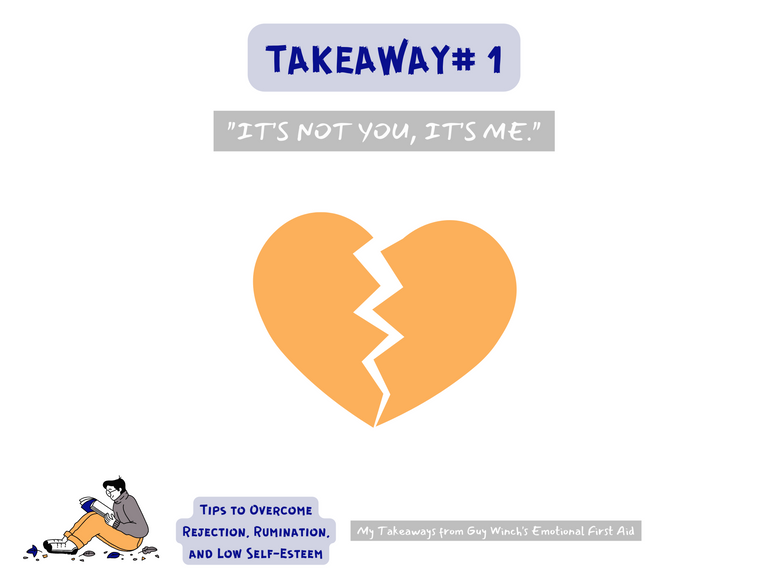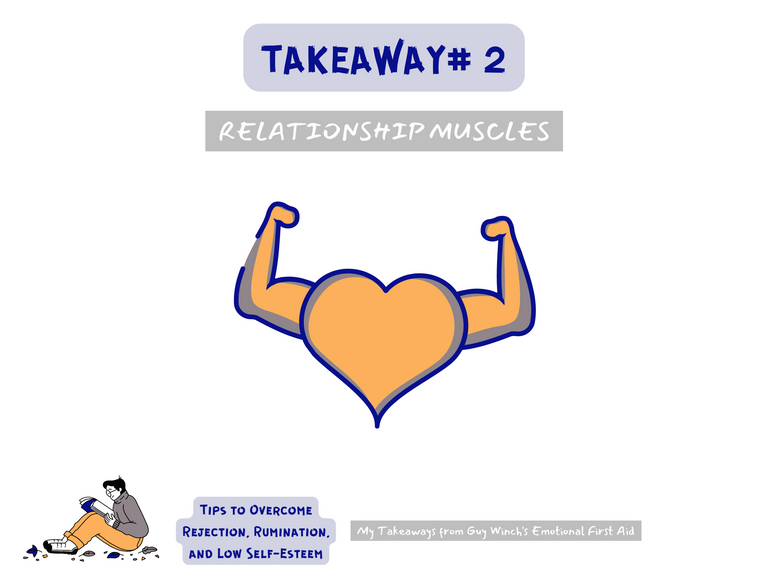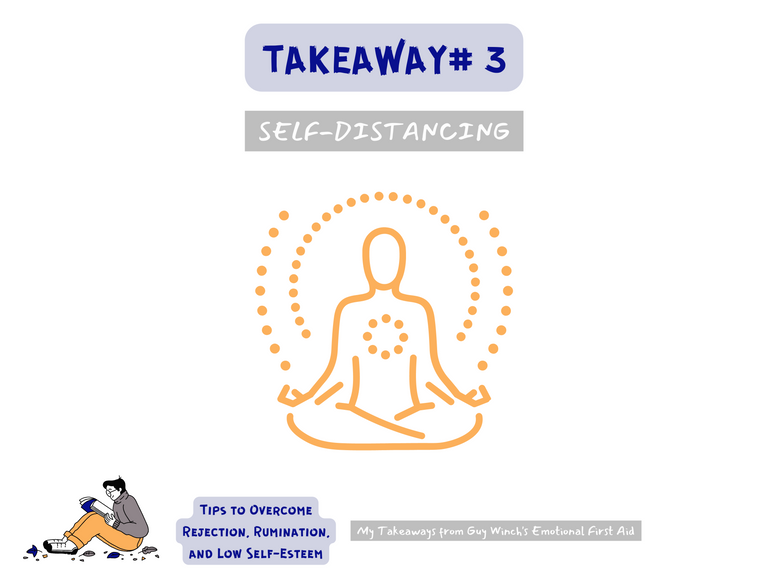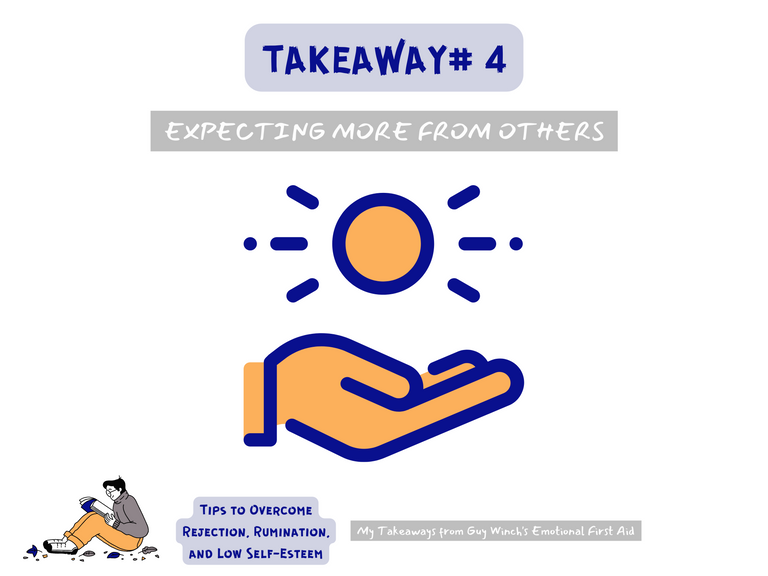
"The reason we take little to no purposeful action to treat the psychological wounds we sustain in daily life is because we lack the tools with which to manage such experiences. True, we could seek the counsel of a mental health professional in such situations, but doing so is often impractical, as most of the psychological wounds we sustain in life are not serious enough to warrant professional intervention."
Welcome to another one of my book reviews! My last one was Creating and Breaking Habits: My Takeaways from James Clear's Atomic Habits. This time, I'll be sharing my takeaways from a book entitled, Emotional First Aid by Guy Winch. The premise of the book is so appealing, especially in these times when people are so into quick fixes and popular psychology. The book aims to provide "practical strategies for treating failure, rejection, guilt, and other everyday psychological injuries."
The author of the book is a psychologist and from his experience, he observes that a lot of adults lack the tools to manage their "psychological injuries." These injuries include rejection, loneliness, loss and trauma, guilt, rumination, failure, and low self-esteem. And these injuries inflict different psychological wounds that disable us in many ways. As compared to physical wounds and ailments, people generally know the first aid or the actions to take to alleviate these wounds and ailments.
The book offers practical tips and tools to get over the psychological injuries and wounds but at the end of each chapter, there is a note on when to seek professional help.
There are things that make sense and are helpful in the book but we have to remember that when it comes to the human psyche, quick fixes don't necessarily work or are appropriate. I still enjoyed reading the book and in this post, I'll share with you my four (4) major takeaways that I found quite interesting and helpful.


"The bottom line is, if people give you the “It’s not you, it’s me” speech—believe them! And when they don’t, assume it’s them anyway."
My first takeaway is from the chapter on Rejection. In the book, each of the psychological wounds is presented with different treatments. Treatment A for overcoming rejection is to Argue with Self-Criticism.
When we're rejected, we try hard to understand why and what went wrong. This can lead to taking things too personally and making overgeneralizations about ourselves. We become self-critical and think that something must be wrong with us which makes the pain of rejection even worse.
When self-criticisms come up, the treatment calls for you to think of counterarguments. Specific to romantic rejections, the best counterargument is to think that the rejection was not about you. It could be because of the situation or that the two of you were not really fit for each other. When the other person tells you that the breakup is not about you, believe him or her. The rejection will still hurt but much less than if you thought it was mostly because of you.
I think this treatment is appropriate to manage the immediate effects of rejection. When we're being too critical of ourselves, we can spiral into despair which will make it difficult for us to continue with our lives and think properly.
But once we're in a better state, I think looking back on the relationship and the rejection should warrant taking accountability for the things we lacked and we could improve on. Since we're already in a better state, the self-critical voice will not be as loud and we will be better at evaluating the truth of the situation and at the same, be kinder to ourselves.


"When we lack meaningful and deep connections with others or when we fail to invest in the relationships we have, we stop exercising the skill sets required to maintain such relationships."
My second takeaway is from the chapter on Loneliness. The wounds inflicted by loneliness include being too critical and judgemental about ourselves and the people around us, and behaving in self-defeating ways that further damage our chances of fostering healthy relationships.
The wounds target our "Relationship Muscles." These are our communication skills, our ability to see others' perspectives, and our ability to emphasize and understand others.
When we don't treat loneliness, it can result in us pushing away the very people we need in our lives to ease our loneliness and then we justify that the distance that has been created is because of our undesirability.
The treatment calls to exercise your relationship muscles. One of the ways to do this is to go through the list of people in your life and think about which of them made you feel good about yourself when you're with them. You should reach out to these people and schedule plans to meet and talk. Socializing with the right people is one of the best ways to relieve our loneliness and, at the same time, allows us to practice how to better relate to other people and foster our relationships.


"Rumination causes us to stew in our negative feelings until we become so consumed with them that we begin to see our entire lives, histories, and futures more bleakly."
My third takeaway is from the chapter on Rumination. The chapter highlights the risk of self-reflection. When we experience painful or difficult situations, we might think that the healthy course of action is to reflect on the experience to get a deeper insight into it. However, some of us who engage in self-reflection can sometimes fall into the trap of rumination. We focus on the negative things and feelings we went through and this goes on and on resulting in us feeling worse.
Overthinkers and people prone to anxiety and depression are the ones who can be easily triggered into a ruminative cycle whenever they self-reflect. Rumination can lead to loneliness and anger because it extends and amplifies feelings of painful and strong emotions. Finally, rumination can rob us of our mental energy and hope about the future by extrapolating our past events to our future.
Self-distancing is the immediate treatment of rumination. It's the act of changing our perspective when we're thinking about our experiences. Instead of immersing in the experience from a first-person perspective, we should try to assume a third-person perspective and see the experience as an observer. I wrote a post about this before and you can read more about it here.


"Most of us only put in as much effort as a situation requires from us. If we can “get away” with being less considerate or less reciprocal, and various other forms of “getting without giving,” many of us will, not because we’re evil, but simply because we can. If people demanded or expected more of us we would do more, but when they don’t, we don’t make the effort."
My last takeaway is from the chapter on Low Self-Esteem. This psychological injury causes people to be more vulnerable to disappointments and failures, to resist positive messages, and to feel insecure and disempowered.
When our self-esteem is low, "normal remarks" and slight insults can impact our disposition and mood more than they typically would. Additionally, when our self-esteem is low, we often respond to praise and positive affirmations by withdrawing, becoming more distant, and shutting down because they make us pressured to live up to those expectations. Finally, having low self-esteem can leave us disempowered to speak up and be assertive because we're afraid that making demands, calling out, and setting expectations, however reasonable, will cause us to be rejected. Low self-esteem and expecting little from others will likely result in us getting very little from them as well.
Treatment D for low self-esteem calls for Increasing Your Personal Empowerment. This can be done by practicing acts of assertiveness starting from simple ones and slowly going up to the more serious ones. We practice expecting more from others and do it in areas where we're more likely to succeed and failure won't be as impactful such as making requests or correcting your order in a restaurant, or calling a customer service representative about a certain problem or request you know the agent will be able to to do. From there, you can make 'bolder' demands or stricter yet reasonable limits and boundaries.

That's it! Those were my main takeaways from Emotional First Aid. They resonated with me because they were quite striking and seemed really helpful. There is so much more to unpack from the book and if you're interested in more, then go ahead and grab a copy of this book. I plan to add this to my re-reading list because I want to dive deeper into the strategies outlined in the book.
My next book review will be for another non-fiction book. Be sure to look out for it. Until the next post. Cheers!
Illustrations were created using Canva and all quotes were taken from the book.

I really like how you divided into four major parts! I'm no bookworm but I got really interested when I read your post. I graduated BS Psychology but the things you have mentioned above hit hard. Your review definitely helped me a lot! Thank you for this @glecerioberto!
You're welcome, Eunice! I'm glad my post resonated with you.
If I had been more informed and aware, Psychology would have been one of my top choices for college. But I chose engineering and here I am. 😅
Yay, it is never too late to study again. Maybe Psychology is calling you 😂
The rewards earned on this comment will go directly to the person sharing the post on Twitter as long as they are registered with @poshtoken. Sign up at https://hiveposh.com.